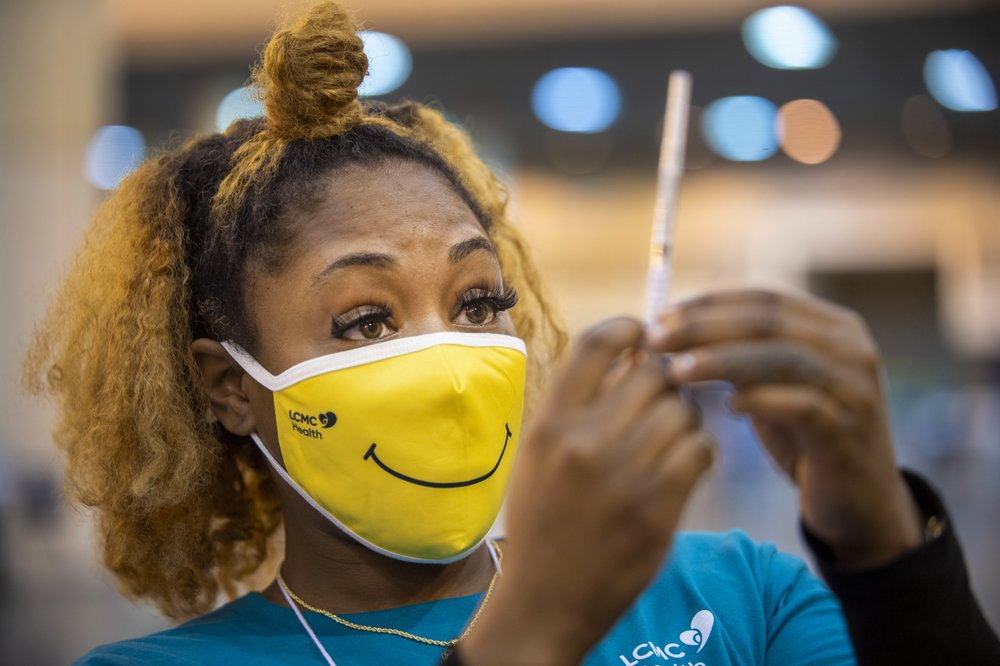Fully vaccinated people can gather without masks, CDC says

Fully vaccinated Americans can gather with other vaccinated people indoors without wearing a mask or social distancing, according to long-awaited guidance from federal health officials. The recommendations also say that vaccinated people can come together in the same way — in a single household — with people considered at low-risk for severe disease, such as in the case of vaccinated grandparents visiting healthy children and grandchildren. The Centers for Disease Control and Prevention announced the guidance Monday. The guidance is designed to address growing demand, as more adults have been getting vaccinated and wondering if it gives them greater freedom to visit family members, travel, or do other things like they did before the COVID-19 pandemic swept the world last year. “With more and more people vaccinated each day, we are starting to turn a corner,” said CDC Director Dr. Rochelle Walensky. During a press briefing Monday, she called the guidance a “first step” toward restoring normalcy in how people come together. She said more activities would be ok’d for vaccinated individuals once caseloads and deaths decline, more Americans are vaccinated, and as more science emerges on the ability of those who have been vaccinated to get and spread the virus. The CDC is continuing to recommend that fully vaccinated people still wear well-fitted masks, avoid large gatherings, and physically distance themselves from others when out in public. The CDC also advised vaccinated people to get tested if they develop symptoms that could be related to COVID-19. The CDC guidance did not speak to people who may have gained some level of immunity from being infected, and recovering from, the coronavirus. Officials say a person is considered fully vaccinated two weeks after receiving the last required dose of vaccine. About 31 million Americans — or only about 9% of the U.S. population — have been fully vaccinated with a federally authorized COVID-19 vaccine so far, according to the CDC. Authorized vaccine doses first became available in December, and they were products that required two doses spaced weeks apart. But since January, a small but growing number of Americans have been fully vaccinated, and have been asking questions like: Do I still have to wear a mask? Can I go to a bar now? Can I finally see my grandchildren? The guidance was “welcome news to a nation that is understandably tired of the pandemic and longs to safely resume normal activities,” said Dr. Richard Besser, president and CEO of the Robert Wood Johnson Foundation and a former acting director of the CDC. “I hope that this new guidance provides the momentum for everyone to get vaccinated when they can and gives states the patience to follow the public health roadmap needed to reopen their economies and communities safely,” said Besser, in a statement. But some said the guidance is too cautious. Dr. Ali Khan, dean of the University of Nebraska College of Public Health, said the guidance is reasonable in many respects — with the exception of travel. The CDC did not change its recommendations on travel, which discourages unnecessary travel and calls for getting tested within a few days of the trip. That could seem confusing to vaccinated people hoping to visit family across the country or abroad. “They need to relax travel for those vaccinated” and to immediately publish electronic standards for documents that show whether a person is fully vaccinated, said Khan, who formerly was a leading CDC disease detective. The new guidance also says nothing about going to restaurants or other places, even though governors are lifting restrictions on businesses, said Dr. Leana Wen, an emergency physician and public health professor at George Washington University who formerly was Baltimore’s health commissioner. Wen has said the CDC should have had some kind of post-vaccination guidance ready in January when some people first began to finish their second doses. And she called the guidance that came out Monday “far too cautious.” “The CDC is missing a major opportunity to tie vaccination status with reopening guidance. By coming out with such limited guidance, they are missing the window to influence state and national policy,” Wen said, in an email. But some people who are fully vaccinated were pleased by Monday’s news. Ruth Michienzi was among those receiving her second and final vaccine dose at a pharmacy inside a Stop and Shop supermarket in Woburn, Massachusetts on Monday morning. The 91-year-old resident of nearby Burlington said she’s fine with having to still wear a facemask in public and follow other safety guidelines even after being fully vaccinated. But Michienzi also said she’s excited to finally be able to take off her mask in front of her three great-grandchildren. She’s seen them in person since receiving her first shot about a month ago but has kept her mask on. “I hope they remember me,” she said. “I’ve been doing all of that for a year, and I don’t want that year to be wasted,” Michienzi said of the safety regulations. “I think it’s smart to wait.” A pair of customers, who weren’t in line to receive shots, though, openly groused about the continued restrictions and voiced fears that stricter mandates on travel and socializing would follow, even as more are vaccinated. Grace McShane, 61, of Melrose, also received her second dose Monday at the same supermarket. She says she qualified for the vaccine because she’s high risk, including suffering a heart attack last year. The in-home caregiver said she too was fine with the continued restrictions even after being vaccinated. “Even if you’re vaccinated, it’s better to be safe than sorry. This is the new normal. This is part of life and you just have to adapt to it,” McShane said. She said she’s looking forward to hugging her three grandchildren without having to wear a mask. Her grown children have also been vaccinated as essential workers, she said. “Just cuddle and give them hugs,” McShane said. “That’s all I want to do.” Republished with the permission of the Associated Press.
Parker Snider: Alabama governor and voters have little input into public health system

Alabama legislators are taking a look at how their branch has set up our state’s public health system. Currently, Alabama is the only state in the nation where the top health organization is not led by someone appointed by the governor or by a board that is appointed by the governor. This would be fine, perhaps even good, if in fact the State Board of Health was elected by a vote of the people. The problem is, however, that this is not how we decide who is on the State Board of Health. In fact, “we”–the people of Alabama–don’t really decide much about the state’s public health system at all. So if the people don’t have much authority, either by electing the board outright or by electing the governor who chooses the board, who’s in charge here? According to the website of the Alabama Department of Public Health (which is synonymous for the State Board of Health), Alabama law designates “the State Board of Health as an advisory board to the state in all medical matters, matters of sanitation, and public health.” Pretty standard. The next line, however, is where we start to see a problem. “The Medical Association, which meets annually, is the State Board of Health.” This “Medical Association” is none other than the Medical Association of the State of Alabama (MASA), the association of the state’s physicians. MASA operates just like any other professional association does, it has its own leadership, its own practices, and its own decision-making bodies–all of which are determined not by the governor or by the people of Alabama, but by the medical practitioners who populate the group’s membership rolls. The Medical Association is also a registered principle (an organization that hires lobbyists) and has, as of March, six registered lobbyists. In fact, advocacy is, according to their website, the “Medical Association’s primary focus.” So what business does an advocacy group have being the State Board of Health? Here’s a healthy reminder that it’s not “part of” or “an advisory board to” the State Board of Health. It is the State Board of Health. Back in another century, the Alabama legislature decided that they didn’t want to create a whole new government agency (perhaps a good intention) to be in charge of public health. The doctors, they thought, should be in charge! And who would say no to that? The medical field, as it should be, is well-respected and given a great amount of deference. They know how to stop diseases, so let’s task them with doing just that. That idea would be all fine and dandy if the State Board of Health were simply to give recommendations to the governor on what she should do. The Code of Alabama makes it clear that this, however, is not the Board’s only role. Instead, the State Board of Health is to adopt “rules and regulations [that are in accordance with Alabama law which] shall have the force and effect of law.” Those health departments in Jefferson and Mobile counties that you heard about in the news early in the pandemic? They’re a local version of this same dynamic. Each county’s board of health, just like MASA is the State Board of Health, is the board of censors of the local county medical society. What about the State Health Officer? Maybe he’s chosen by the governor or elected? Not quite. The State Health Officer is elected by the State Committee on Public Health. Members of the State Committee on Public Health are–you guessed it–selected by the State Board of Health which, we’ve established, is the medical association. How about the county health officers? Again we see a similar dynamic. Here, the county boards, i.e. the county medical associations, appoint the health officer. One caveat here – the president of the county commission is a member of the county board. So there is some participation of the people in this appointment, albeit minor and ineffective at overpowering the decisions of the non-elected members. The truth is that you can’t blame the medical association nor the state or local county health officers for the way this system is set up. They’re simply operating under a paradigm they’ve been given. That doesn’t mean the system shouldn’t be changed though. With any human system of authority, checks and balances are needed to prevent tyranny. And, to be fair, there are some checks (the fact that the legislature can change this system at any time, for example), but they do nothing to address the problem of a private association being given the power of the state. The teachers union, for example, is not the Department of Education (and it shouldn’t be). Why does our public health system, which has the power to quarantine individuals to their homes, get to skirt democracy and enjoy its own kingdom? No other state in the union operates in this way. Even California’s Secretary of Health and Human Services is appointed and has to get approved by the State Senate. Their system is more democratic and more conservative than ours. Thankfully, there is a bill by Senator Jim McClendon with 17 co-sponsors moving through the State House that would reconstitute the Alabama Department of Health into an agency led by a cabinet official appointed directly by the governor instead of a private group. The bill, which would take control away from the Medical Association and give it to a popularly elected official, has passed the Senate Health Committee and moves now to the full Senate. This reform, with an additional provision to require the Senate to confirm the nominee (this year of executive action has shown the need for legislative approval), needs to become law. The Alabama legislature should prioritize it and debate whether the current system really makes sense in a state that’s all about self-governance and defending our rights. Because, in the end, we can’t let California be more conservative than Alabama, can we? Parker Snider is Director of Policy Analysis for the Alabama Policy Insitute.
Councilman asked to resign over racially insensitive post

An Alabama councilman apologized for making a racially charged social media post two years ago, but a fellow council member believes the apology isn’t enough. On Saturday, Decatur Councilman Hunter Pepper said he was “extremely sorry” for a 2018 Facebook post where he implied that protesters marching against the death of Black man at the Galleria Mall in Hoover should be run over. The mall in the suburban Birmingham area was the site of a 2018 police shooting where an officer fatally shot an armed Black man after mistaking him for the gunman in an earlier shooting at the mall. The shooting of 21-year-old Emantic “EJ” Bradford Jr. prompted a series of protests. Pepper’s post was to an article on the protests in which he commented, “See I have to go shopping there next week and we gone play a game called red rover red rover you fools gone get ran over!” Pepper, who is the youngest person to be elected to the Decatur City Council, was 16 years old when he created the post. He said the post was “very ignorant” and that he didn’t “remember being that aggressive as a juvenile.” Pepper also said that the post makes no mention of race but “unfortunately it took a turn in that direction to involve race. “There is nothing in that post that mentions race whatsoever,” Pepper said. “I’m not a racist individual, and don’t like racism and am extremely sorry how that turned out.” Councilman Billy Jackson said Pepper “has no business representing any population in the city of Decatur” and should resign, news outlets reported. Jackson said Pepper’s age at the time should not be a factor because “that language is inexcusable.” “I’ve been 16 years old, and I’ve been around 16-year-olds,” Jackson said. “Never have I heard somebody suggest running over people, maiming people and possibly killing people. I am not sure he can blame it on age.” Jackson added that although Pepper did not blatantly mention Black people in his post, the protesters were mainly Black. Pepper, now 19, won the District 4 City Council race last year. Jackson said although he is calling for Pepper’s resignation, any removal from office would be residents’ decision. Republished with the permission of the Associated Press.
Lottery, casino bill heads to Alabama Senate vote

The Alabama Senate will debate a gambling bill soon, the bill’s sponsor said Monday, signaling the first major test of the proposal to begin a lottery and allow as many as eight casinos statewide. Republican Sen. Del Marsh of Anniston said Monday that he expects his bill will come to the Senate floor Tuesday. The proposal, which would have to be put before Alabama voters if approved by lawmakers, would authorize a state lottery, five casinos locations and a compact with the Poarch Band of Creek Indians for casino games at their three sites. Marsh stressed, however, that many final details were still under negotiation. “One way or the other, a bill is coming out tomorrow and we are going to vote. That’s where I am,” Marsh said, expecting debate to begin as early as Tuesday. “I’ve been optimistic since day one. I just think the mood is there to get something for the people to vote on,” Marsh said. Senate Rules Chairman Jabo Waggoner, R-Vestavia Hills, was less certain the bill would get a vote Tuesday, saying it was a bit “up in the air” with last-minute negotiations and Marsh’s discussions with House members and others. “Some of the senators don’t want to cast that vote knowing it is just going to die in the House,” Waggoner said. Waggoner said he supported the idea of a lottery, but wanted to see the “final product” as far as the casino proposal. The most recent version of the bill proposes establishing a state lottery and five casinos — one at four existing dog tracks plus a fifth site in north Alabama that would be run by the Poarch Band of Creek Indians. It also would authorize a compact with the Poarch Band for casino games at their three existing sites that currently have electronic bingo machines. Other smaller operators, including sites in Lowndes and Houston counties, have asked to be included. Marsh said that, for now, the bill is limited to the five sites. Marsh said governor Kay Ivey was “very clear” that she didn’t want a large number of casinos in the state. Asked if the governor wants to limit the number of sites to five, a spokeswoman said, “Governor Ivey wants to be able to support the final gaming proposal from the Legislature” and “has expressed this to Senator Marsh and others, and we still have some work to be done.” “Ultimately, we must be able to control and regulate gambling if it is going to be legal in Alabama, and the intention is certainly not to have a casino on every corner. The governor supports the people of Alabama having the final say,” Ivey spokeswoman Gina Maiola said in a text message. Republished with the permission of the Associated Press.


